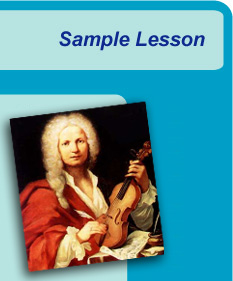| |
Sample Lesson: Antonio Vivaldi (1678-1741)
Opening and Interview for 2 nd -3 rd Grade
Dress up as Vivaldi, wearing black pants, white shirt, black or gray coat, black tie that can be tied in a bow, and red “colonial-style” wig. Ask a teacher or student to read the interview questions. Use your best/worst Italian accent.
Interviewer: We are here today to bring you a music lesson called Composer Countdown. Can anyone tell me what a composer does? (call on students to answer) A composer is a person who writes music. A man or a woman might have an idea for a piece of music and they would be the one to write that idea down. All the music you hear on the radio, or TV, or on CDs, etc. has been composed by someone. Today we are going to have a special visitor. His name is Antonio Vivaldi and he is a composer. He wrote a piece about the four seasons. Here he is now!
Vivaldi: (Enter, coughing) Good day! Is this the music class? I came here today to meet some music students.
Interviewer: Mr. Vivaldi! We are so honored to have you here with us today. I am Mrs./Mr. ________.
Vivaldi: Buon giorno! (cough, cough!) Good day!
Interviewer: I hear an accent in your voice. Where are you from?
Vivaldi: I was born in Venice , Italy . Venice is a very beautiful city. The streets are made of water! We travel from place to place in little boats, called gondolas. (cough, cough!)
Interviewer: I just happen to have some pictures of Venice to show you. Notice the canals and gondolas. (show pictures) Are you all right Mr. Vivaldi? I have noticed you coughing.
Vivaldi: Oh, yes. Ever since I was a small child I have had asthma. In fact, my parents were very worried about me when I was very young. They were afraid that I would get so sick I might die.
Interviewer: Mr. Vivaldi, could you tell us a little bit more about your childhood?
Vivaldi: Yes. I was born in Venice in 1678. My father was a famous violinist and he taught me how to play the violin when I was very young.
Interviewer: Did you go on to study at a famous music school?
Vivaldi: No, I didn't. My parents felt that I should study to become a priest and work for the church. So that is what I did. But I was always more interested in music and I never worked very hard at being a priest, so I left my work at the church to be a full-time musician.
Interviewer: We know you went on to teach violin. Did you do that in your home?
Vivaldi: Oh, no. I was hired to teach at a very famous school for girls. Some of the best instrumentalists lived at this school. People would come from miles around to hear our concerts. They played many of my own pieces!
Interviewer: Mr. Vivaldi, you have written over 450 concertos, operas, music for violin and other instruments. What would you say is your favorite kind of music to write?
Vivaldi: That is a difficult question. But I would say the music I like to compose the most is music that is used for worship. I think God can speak to our hearts through music.
Interviewer: I can understand why that would be so satisfying. Vivaldi: Oh, my goodness! Look at the time! I must leave now to go teach my next violin lesson. Ciao, Mrs./Mr. _________.
Pass out four stickers, representing the four seasons, to each student. Listen to an example of each season from “The Four Seasons” and, aided by the clues on the board, have them raise their hands and tell what they heard and which season they thought it was. Confirm the season, have them write the season name, and one or two characteristics on their worksheet. They can put the corresponding sticker anywhere in the box. Make sure they know that the only instruments used are strings and harpsichord. "Many composers have written music that is descriptive. Vivaldi wrote The Four Seasons as a result of reading some poems about nature.
Today, we are going to do the same. We are going to read a poem and then perform a piece, inspired by this poem.” (Read Far From the Madding Crowd by Nixon Waterman. Talk about the sounds in nature that are mentioned. Show them which instruments might best be used to make those sounds.
Here are some suggestions:
Shaking leaves – shakers, sandpaper blocks, even plastic grocery
Bees – kazoos getting louder and softer.
Frogs – guiros, played with the stick part of the mallet, on the bumpy part.
Crickets – plastic clickers you find at party stores.
Water – choir chimes, rainsticks, xylophones.
Birds – We use bird callers from REI (the camping store) but whistling would work or possibly slide whistles, played softly.
Wind – Rub hand on the head of a drum. You can use rhythm sticks or puilli sticks, hit together, to sound like tree branches moving in the wind. Use a drum to keep a steady beat.
|









